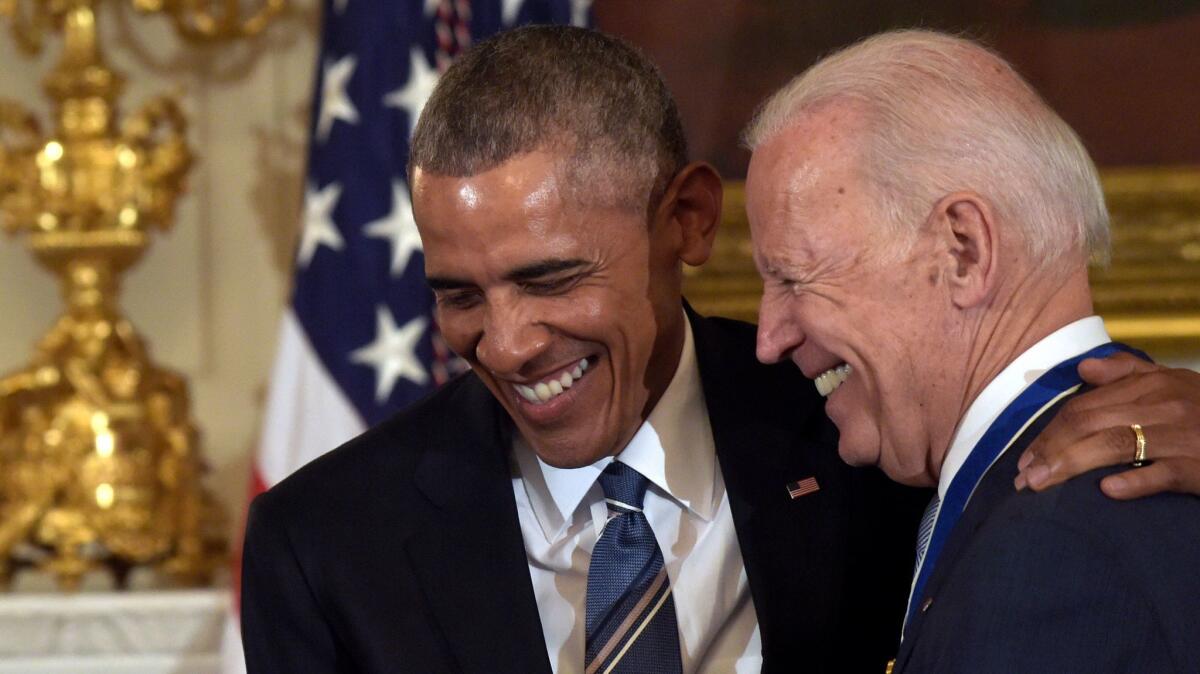Editorial: Farewell to Barack Obama: A humane, intelligent and (mostly) effective leader

- Share via
It’s a cliché that definitive judgments of a presidency take time to develop. Presidents praised in their own era — think of John F. Kennedy — are often subject to revisionist reappraisals by later historians, and the process also works in reverse.
Yet as Barack Obama prepares to vacate the White House we can say this much with confidence: The 44th president was a conscientious and intelligent leader who espoused humane values, inspired millions of Americans and successfully fulfilled some of his most significant promises.
They include skillfully managing a recovery from a recession he inherited; protecting the rights of racial minorities and gay, lesbian and transgender Americans; combating international terrorism without engaging in religious stereotyping; providing health insurance to tens of millions of Americans who had previously gone without; and promulgating a Clean Power Plan to reduce carbon pollution from power plants.
Obama’s dignity and gravitas seem, of course, only more appealing as the Trump presidency approaches.
His administration joined with other nations in forging an agreement with Iran that blocked its path — at least for a 10-year period — to developing a nuclear weapon; it endorsed the Paris Agreement on climate change; and it ended an anachronistic and counterproductive Cold War policy of refusing to deal with Cuba.
Obama’s White House was free of the corruption that tarnished the administrations of some of his predecessors. And Obama throughout his tenure displayed dignity, even in the face of vicious and sometimes racist attacks that no other president has had to endure.
There were also disappointments, at home and abroad, including his failure to persuade Congress to enact comprehensive immigration reform or to close the infamous detention facility at Guantanamo Bay. Ultimately, despite coming to office as the anti-George W. Bush, Obama was unable to extricate the United States militarily from the Middle East and Afghanistan.
On election night in 2008, Obama told a jubilant crowd in Chicago that “on this date, in this election, at this defining moment, change has come to America.” The 47-year-old first-term senator, the first African American to be elected president, encouraged his supporters — and the country — to “resist the temptation to fall back on the same partisanship and pettiness and immaturity that has poisoned our politics for so long.” In the flush of his improbable victory, such a magical transformation briefly seemed possible.
Of course, partisanship and pettiness persisted, and frustrated many of Obama’s legislative initiatives, not to mention a nomination to the Supreme Court that the Republican Senate shamefully refused even to consider. The sad truth is that Obama’s election didn’t usher in a post-partisan America any more than it did a post-racial one. He leaves behind a divided and acrimonious nation.
Republicans argued that the president has only himself to blame for the partisan chasm that prevented much of his domestic agenda from being enacted. More generally, they accused him of high-handedness and a propensity to short-circuit the legislative process with executive actions such as his temporary legalization of some immigrants in the country illegally and his aggressive use of recess appointments, for which he was reprimanded by the Supreme Court. But Obama’s “pen and phone” unilateralism was mostly a response to Republican obstructionism.
On foreign policy, Obama campaigned on a platform of ending the wars that had cost thousands of Americans lives in the aftermath of 9/11, including the ill-considered invasion of Iraq. In his acceptance speech at the 2008 Democratic convention, he promised to “end this war in Iraq responsibly and finish the fight against Al Qaeda and the Taliban in Afghanistan.”
U.S. troops did completely withdraw from Iraq at the end of 2011. But the rise of Islamic State persuaded Obama to order air strikes in that country and to deploy 5,200 U.S. troops in “train, advise and assist” roles. In Afghanistan, Obama’s advisers warned him that complete withdrawal of U.S. troops would undermine the weak central government in its battle with the Taliban; some 8,400 U.S. troops will remain after Obama leaves office.
But if Obama has been too interventionist for some of his supporters, he hasn’t been interventionist enough for some of his critics – particularly when it comes to Syria. He has been criticized — including by some members of his own State Department — for not taking military action against the government of Syrian President Bashar Assad in an attempt to end that country’s civil war.
The Syrian civil war has been a humanitarian disaster, yet we understand Obama’s concern that a U.S. effort to topple Assad — directly or in alliance with supposedly moderate Syrian rebels — would have dangerous consequences, including the possibility of involving the U.S. in another major war in the Middle East. Overall, Obama’s use of U.S. military force has been prudent and pragmatic; we would recommend his careful approach to his successor, who inherits a dangerous and increasingly disordered world.
And speaking of that successor, Obama’s dignity and gravitas seem, of course, only more appealing as the Trump presidency approaches. The incoming president, who fired up his political career by cynically questioning Obama’s citizenship, has betrayed a reckless, petulant, bullying demeanor that threatens his ability to do the job. Trump may not embrace many of Obama’s policies; but he would serve himself and the country well by studying the way his predecessor conducted himself.
Follow the Opinion section on Twitter @latimesopinion and Facebook
A cure for the common opinion
Get thought-provoking perspectives with our weekly newsletter.
You may occasionally receive promotional content from the Los Angeles Times.






